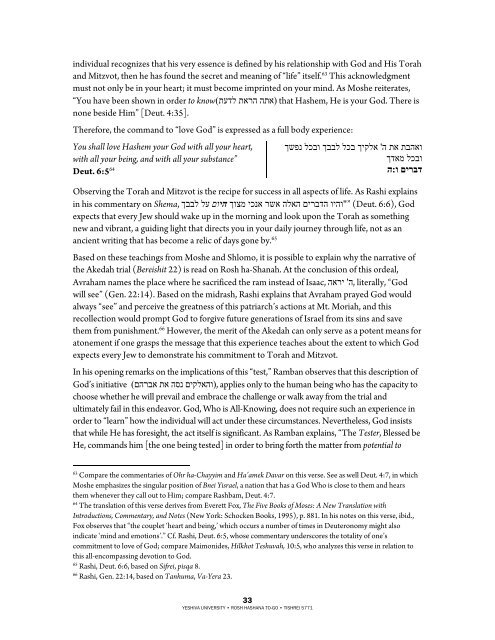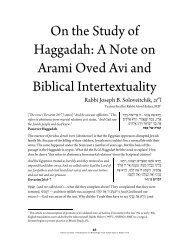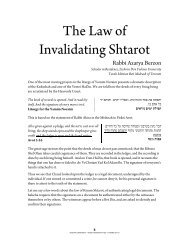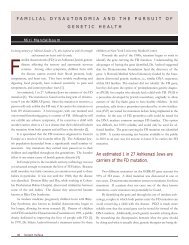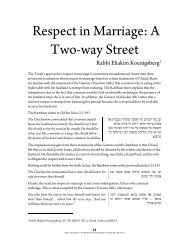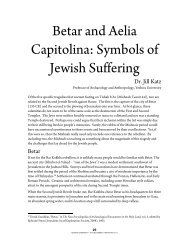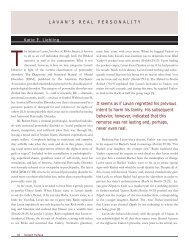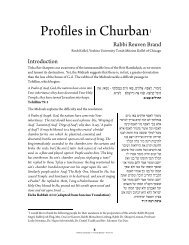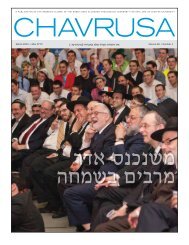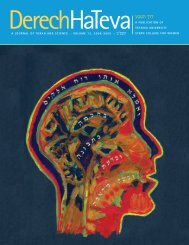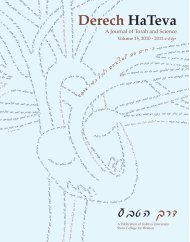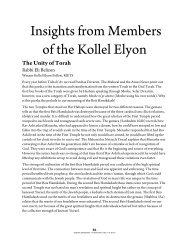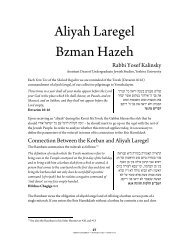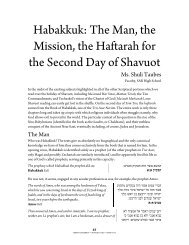YESHIVA UNIVERSITY • ROSH HASHANA TO-GO ... - YUTorah.org
YESHIVA UNIVERSITY • ROSH HASHANA TO-GO ... - YUTorah.org
YESHIVA UNIVERSITY • ROSH HASHANA TO-GO ... - YUTorah.org
You also want an ePaper? Increase the reach of your titles
YUMPU automatically turns print PDFs into web optimized ePapers that Google loves.
individual recognizes that his very essence is defined by his relationship with God and His Torah<br />
and Mitzvot, then he has found the secret and meaning of “life” itself. 63 This acknowledgment<br />
must not only be in your heart; it must become imprinted on your mind. As Moshe reiterates,<br />
“You have been shown in order to know ( תעדל תארה התא)<br />
that Hashem, He is your God. There is<br />
none beside Him” [Deut. 4:35].<br />
Therefore, the command to “love God” is expressed as a full body experience:<br />
You shall love Hashem your God with all your heart,<br />
with all your being, and with all your substance”<br />
Deut. 6:5 64<br />
33<br />
<strong>YESHIVA</strong> <strong>UNIVERSITY</strong> <strong>•</strong> <strong>ROSH</strong> <strong>HASHANA</strong> <strong>TO</strong>-<strong>GO</strong> <strong>•</strong> TISHREI 5771<br />
ךשפנ לכבו ךבבל לכב ךיקלא 'ה<br />
תא תבהאו<br />
ךדאמ לכבו<br />
ה:<br />
ו םירבד<br />
Observing the Torah and Mitzvot is the recipe for success in all aspects of life. As Rashi explains<br />
in his commentary on Shema, ךבבל לע םויה<br />
ךוצמ יכנא רשא הלאה םירבדה ויהו"<br />
” (Deut. 6:6), God<br />
expects that every Jew should wake up in the morning and look upon the Torah as something<br />
new and vibrant, a guiding light that directs you in your daily journey through life, not as an<br />
ancient writing that has become a relic of days gone by. 65<br />
Based on these teachings from Moshe and Shlomo, it is possible to explain why the narrative of<br />
the Akedah trial (Bereishit 22) is read on Rosh ha-Shanah. At the conclusion of this ordeal,<br />
Avraham names the place where he sacrificed the ram instead of Isaac, הארי 'ה,<br />
literally, “God<br />
will see” (Gen. 22:14). Based on the midrash, Rashi explains that Avraham prayed God would<br />
always “see” and perceive the greatness of this patriarch’s actions at Mt. Moriah, and this<br />
recollection would prompt God to f<strong>org</strong>ive future generations of Israel from its sins and save<br />
them from punishment. 66 However, the merit of the Akedah can only serve as a potent means for<br />
atonement if one grasps the message that this experience teaches about the extent to which God<br />
expects every Jew to demonstrate his commitment to Torah and Mitzvot.<br />
In his opening remarks on the implications of this “test,” Ramban observes that this description of<br />
God’s initiative ( םהרבא תא הסנ םיקלאהו)<br />
, applies only to the human being who has the capacity to<br />
choose whether he will prevail and embrace the challenge or walk away from the trial and<br />
ultimately fail in this endeavor. God, Who is All-Knowing, does not require such an experience in<br />
order to “learn” how the individual will act under these circumstances. Nevertheless, God insists<br />
that while He has foresight, the act itself is significant. As Ramban explains, “The Tester, Blessed be<br />
He, commands him [the one being tested] in order to bring forth the matter from potential to<br />
63 Compare the commentaries of Ohr ha-Chayyim and Ha’amek Davar on this verse. See as well Deut. 4:7, in which<br />
Moshe emphasizes the singular position of Bnei Yisrael, a nation that has a God Who is close to them and hears<br />
them whenever they call out to Him; compare Rashbam, Deut. 4:7.<br />
64 The translation of this verse derives from Everett Fox, The Five Books of Moses: A New Translation with<br />
Introductions, Commentary, and Notes (New York: Schocken Books, 1995), p. 881. In his notes on this verse, ibid.,<br />
Fox observes that “the couplet ‘heart and being,’ which occurs a number of times in Deuteronomy might also<br />
indicate ‘mind and emotions’.” Cf. Rashi, Deut. 6:5, whose commentary underscores the totality of one’s<br />
commitment to love of God; compare Maimonides, Hilkhot Teshuvah, 10:5, who analyzes this verse in relation to<br />
this all-encompassing devotion to God.<br />
65 Rashi, Deut. 6:6, based on Sifrei, pisqa 8.<br />
66 Rashi, Gen. 22:14, based on Tanhuma, Va-Yera 23.


